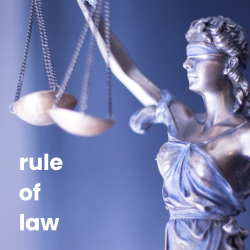The interdependence of the rule of law with the right to freedom of thought, conscience and religion

Blog post by Jessica Giles
The rule of law has, in recent years, become a global phenomenon. Nation states are measured against a set of criteria to establish where they sit in the rule of law ratings. Despite this, the abuse of internationally agreed human rights standards continues across a breadth of issues. The reasons for this are varied and complex. At their core sits the key issue. This is that different nation states have fundamentally different approaches to public living together, often taking non-Western approaches to the organisation of public life.
This blog briefly explains the approach to the rule of law within international compliance mechanisms. It then explores the sociological analysis of Professor Martin Krygier. Krygier posits that what states should be considering is whether the conditions for embedding the rule of law exist, rather than whether a checklist of aspects of rule of law compliance have been met. The blog then concludes by identifying that freedom of thought, conscience and religion as a fundamental right is key to creating the conditions necessary to embed the rule of law in society. This makes the rule of law and the right to freedom of thought, conscience and religion interdependent
The effective functioning of Western liberal democracies is dependent on the incorporation of the rule of law into their constitutional and legal systems. The rule of law in its modern form incorporates the core Dicean ideas that first, no one is punishable except for a breach of the law, according to a legal process in the ordinary courts. Second that no one is above the law. Third, that the UK constitution is infused with the concept of the rule of law which incorporates rights to personal liberty.
The rule of law has, however, according to academics, lawyers and constitutional theorists, INGOs and the United Nations expanded well beyond the original concept, to include as many as 20 attributes. In particular, it now also incorporates a tranche of human rights. Thus, in order to be rule of law compliant, a legal system needs to demonstrate human rights compliance as well.
The incorporation of human rights into the rule of law is contested by some academics. They argue that the rule of law is about fair legal processes not about the content of the law. Incorporating human rights into the rule of law drives it into the realm of aspirational aims for may legal systems, thus creating a Westernised focus on what rule of law compliant legal systems ought to be. It imposes Western ideas of what law should be into systems which do not otherwise fit with the Western democratic model of governance. Nevertheless, international rule of law measures now assess human rights compliance as one of several measures of success.
Professor Martin Krygier argues that assessing a country’s rule of law compliance against a list of factors, including human rights compliance, can create isomorphic mimicry. This means a country can perform well by ticking items off a list. However, in reality, the power dynamics within a country can prevent actual enjoyment of the rule of law by the population. He argues that embedding the rule of law depends on identifying where arbitrary power lies in a country and by seeking to identify how to develop the virtues necessary for embedding the rule of law within that power base.
This, however, is not the complete picture. Whether one adopts a narrow or wide formulation of the rule of law, it is necessary to consider how virtue might be developed within a power base or a population. If Krygier is right, and the effectiveness of the rule of law requires the development of the necessary virtues within the population, then key to the rule of law is the enjoyment of the right to freedom of thought, conscience and religion.
Freedom of thought, conscience and religion is essential to embedding the rule of law because there are limits to the extent to which virtue informing public living together can be imposed or demanded by ruling authorities in the absence of the will of the people.
In order to develop virtue, there needs to be freedom to explore various approaches to virtue. This then needs to be supported by mechanisms to support the building of consensus. Public consensus then informs common rules for public living together. This necessarily involves taking plural points of view into account, which in turn is dependent on the enjoyment of freedom of thought, conscience and religion.
The rule of law and freedom of thought, conscience and religion thus become interdependent. In order to embed and enjoy the rule of law, individuals need to be able to explore virtue and reach consensus on societies common norms. In order to enjoy freedom of thought, conscience and religion a society needs to provide some constitutional protection so that they can enjoy the right. The question that international measures of the rule of law might usefully ask is “how far is freedom of thought, conscience and religion enjoyed within a nation state?”. This might provide a litmus test for establishing the extent to which the rule is law might be or is actually enjoyed within a nation state.

Jessica Giles
Jessica Giles is a senior fellow of the higher education academy and a dual qualified barrister and solicitor. She currently works as a law lecturer at the Open University and is Research Lead of the Project on Interdisciplinary Law and Religion studies.
Jessica worked as a solicitor and then as a law reporter for the Incorporated Council of Law Reporting (The Weekly Law Reports) for 17 years, gaining experience in the Chancery and Queen’s Bench divisions as well as the Court of Justice of the European Union. She began teaching at the Open University as an associate lecturer in 2006 and joined the central academic team in 2013. Her teaching spans public law, property law and international human rights law. She researches in the field of the scholarship of teaching and learning, in particular, on both employability and interdisciplinary teaching and learning. Her academic research explores the intersection of human rights law and philosophical theology.